A Simple Moment of Weakness
Reconnecting with History—Special Installment
“The President’s job—and if someone sufficiently vain and stupid enough is picked he won’t realize this—is not to wield power, but to draw attention away from it.” —Douglas Adams, The Hitchhiker’s Guide to the Galaxy
My phone buzzed early in the evening. A message from one of my paid subscribers telling me about an impending press conference by one of my least favorite subspecies of humanity: a politician. She requested that I watch the conference and give my take on the potential historical significance of the event and/or share some history that might inform her understanding of the event.
This is not my idea of a “good time.” I would literally rather explain the evolution of torture techniques during the Spanish Inquisition—that, at least, would have a flavor of the lurid to leaven the horror on display.
Nevertheless, I allowed myself to be convinced. I need to keep my paid supporters happy (and yes, if you’re a paid supporter, I will pay attention to your requests for topics—I may not always fulfill them the next day, but they will go into the hopper. I’m an honest intellectual whore: I know how to sing for my supper). Besides, the event in question turned out to be a lot more important than I was hoping it would be. So here we go.
During his years as Vice President, Joe Biden appropriated a bunch of classified documents, some of which wound up in file boxes in his garage. On the face of it, this seems an even more egregious a violation of the official documents handling laws than did former Secretary of State Hillary Clinton’s email server (a matter on which the DOJ declined prosecution) and former President Donald Trump’s stockpiling of maybe-declassified-then-reclassified-but-maybe-not documents in his part-time residence at Mar-A-Lago resort in Florida (for which he is currently being prosecuted).
The special prosecutor’s report on the Biden matter dropped today. You can read it here. You can read a Twitter thread digesting it here (warning: partisan account).
Tucked among the pages were an implied justification for declining to prosecute (the administration cooperated with the investigation, and without obstruction charges in the mix the rest becomes harder to prosecute) and a startling explicit justification: President Biden, the most powerful man on the planet, is incompetent to stand trial.

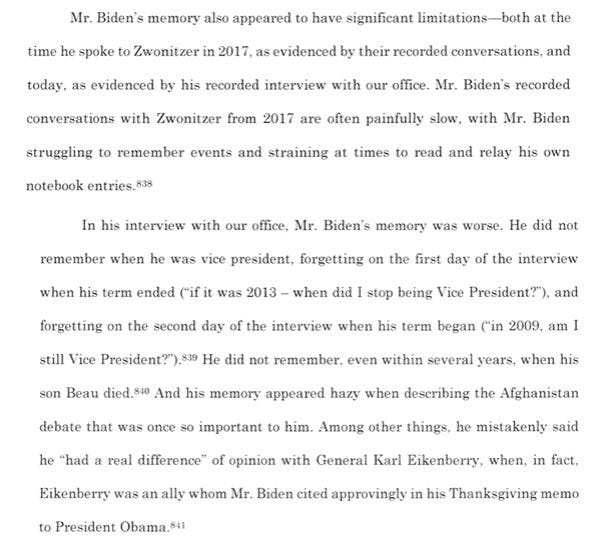
Biden held a press conference in response:
It did not go well.
You can watch it for yourself here:
Even as Biden declared himself competent and his memory sound, he forgot the name of the church from which his son’s memorial rosary was procured, he mixed up the President of Egypt with the President of Mexico, he inadvertently (if subtly) changed American foreign policy with regards to the current war between Israel and Hamas, he seemed unsure for a fleeting moment whether his dead son was, in fact, dead [3m11s], and he claimed responsibility for the crimes of which the special prosecutor had just declined prosecution (even while denying they took place and dissembling about their nature).
In my lifetime so far, I have seen seven Presidents. If I were to evaluate them by competence (Note: This is NOT a comment on the policies or politics of any of these men), I’d characterize them thusly:
Two of them were pretty-okay (Reagan and Bush 1), one was not politically astute (Carter), and then there was the parade of the most incompetent, self-involved, and corrupt dip shits ever to occupy the Oval Office, each one worse than the last (Clinton, Bush 2, Obama, and Trump—the first two of these were, at least, capable of holding productive conversations with other people in government, despite their inability to be consistently interested in the actual prosecution of their own avowed policy agendas).
Even if he hadn’t done so before, Biden revealed in this press conference that he is, hands down, the least-fit occupant of the Oval Office in the history of the Republic (which, in light of his four immediate predecessors, is a hell of an accomplishment).
In a “normal” world—which is to say, the artificial world my generation was taught about in our high school history classes, which is far from normal—Joe Biden would be removed from office tomorrow, on 25th Amendment grounds, by his own party. The party itself would not lose power, as they still control congress and would still control the White House, and they would head into the November Election from a position of moral strength: “We care so much about the country that we will remove this good man who isn’t up to the job anymore.”
Failing that, he would be impeached by his own party.
And, failing that, he would be locked out of a brokered Democratic Convention and not allowed to run for a second term.
But that “normal world” is long gone.
The official nature of the prosecutor’s statements provide a kind of election ammunition to the opposition that might actually overwhelm all electioneering efforts1, which might mean that the Democratic party has no choice but to remove Biden by one of the aforementioned mechanisms
It is possible that one of these things might happen, but there are some good reasons to suspect they won’t.
First, Biden was declared incompetent to serve by his own supporters before he was elected—no less auspicious an outlet than The Atlantic declared that he did not need a mind to be President, he only needed a body to legitimize the party apparatchiks that would run the country in his name.
There is very good reason to believe that Biden has never really been President, and that, instead, a choir of private advisors (likely including both the Bush and Obama families, definitely including many of his cabinet members, all with the active help of Jill Biden) have been running the show. It not only would explain why the administration has been as stable as it has been (take a moment and let the gravity of that statement sink in), it would also explain why there has been no coherent policy agenda—foreign or domestic—beyond “print as much money as we can as quickly as possible to fund the NGO and defense sectors.”
Removing Biden because he is incompetent after he was elected because he was incompetent might not seem like a winning proposition. Moreover, since everyone already knows he’s incompetent, the party might bet that these revelations will amount to a big nothingburger (I am already seeing propaganda to this effect).
Second, whoever is running the administration is unlikely to be willing to relinquish power, so they may push to keep Biden in power whatever the cost—they already demonstrably have a lot of leverage in the halls of Congress (one need look no farther than the virtually non-existent battles over the massive foreign aid and domestic spending bills over the last four years for evidence of this assertion), so they may feel as if they have nothing to lose…and can’t lose anyway.
Third, if Trump is convicted on the relevant grounds (i.e. those that implicate the 15th Amendment), he can get elected all he wants—he will never be allowed to serve a second term.
Fourth, the system as currently constituted doesn’t really need a President, and (if the last three administrations are any indication) prefers to run more-or-less without one. Obama was so ineffectual and misanthropic he couldn’t pass a budget for years and he rarely even met with his cabinet, Trump was so hated that the entire executive bureaucracy shut him out, and Biden has never really been there. The last thing anyone in the Executive Branch wants is a President that is willing to wield any power that isn’t symbolic and/or ceremonial. Making any move that might turn this year’s vote into a real election risks upsetting the situation.
What Does it Mean?
That’s all political gamesmanship stuff. I include it because it’s what most people are interested in, but it’s generally not important in the long run.
Unfortunately, this stupid little press conference got my attention, not because of anything in particular that was said, but because of what it showed.
Make no mistake: Biden gave this speech because he had no choice. After being publicly humiliated by a special prosecutor who was (judging by the tone of the report) quite sympathetic, he had to step up, take the helm, and prove that he was a competent leader, and that America was strong.
The fact that he even gave the speech shows that his administration is in mortal peril.
His performance at the speech showed the world that the American President is impotent and his handlers are so incompetent they let him give this speech in a way that could not fail to end in disaster. I guarantee you that behind the scenes they are scrambling.
The media feeding frenzy which followed (which it gives me no pleasure to participate in) shows unequivocally that the United States—the most potent military and economic force on the planet, the country that controls the banking and finance industry for the bulk of the globe, and the nation which produces the world’s reserve currency—is no longer capable of fulfilling its role.
It also shows that the administrative state, as a whole, is now operating at a level functionally equivalent to the administrative states of modern-day China, the final generation of the Roman Republic, and the Weimar Republic.
The dominoes are poised to fall, and this press conference may prove to be the breeze that starts the cascade.
The Dominoes Now Arrayed
Despite our tremendous national advantages, the American homeland is in trouble. Since 2000, both sides have intimated that every Presidency was stolen. This congealed into solid claims of perpetual illegitimacy starting in 2016.
The current Constitutional crisis in Texas has also revealed something terrifying:
There is a contiguous geographical power block (with a couple outliers) that is opposed—not just to the current administration—but to the United States Federal Government itself.
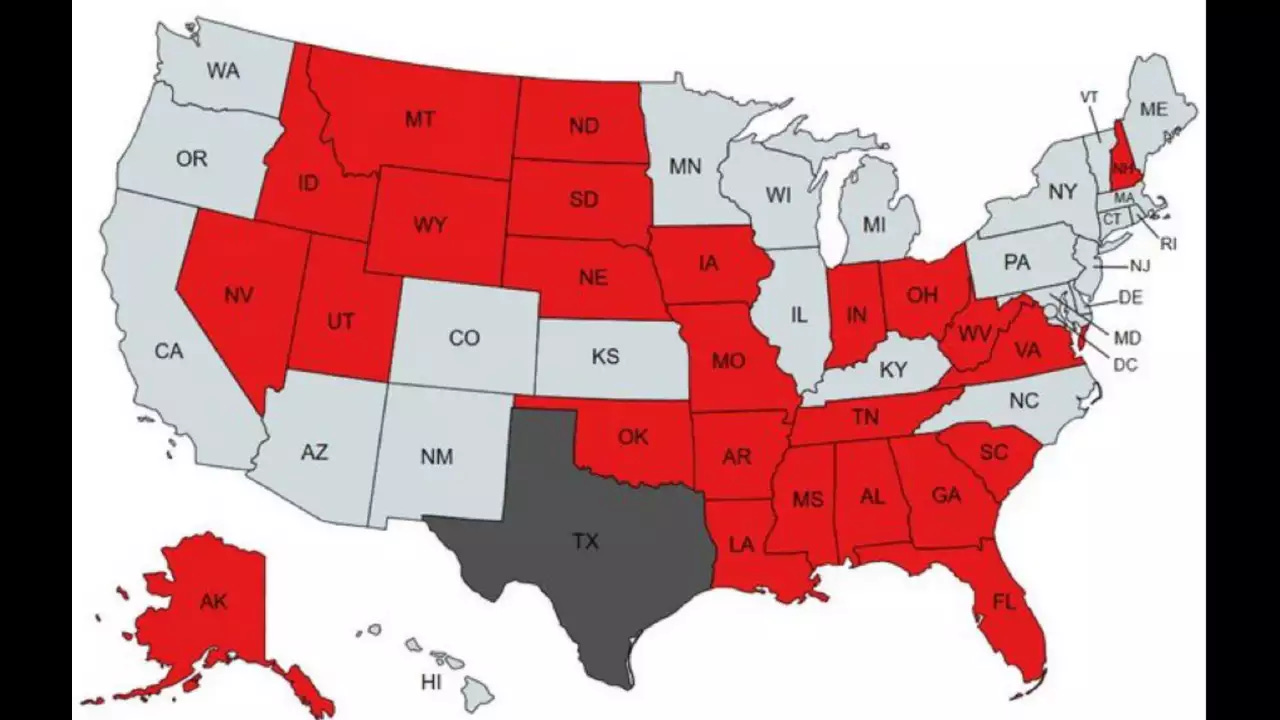
And that power block controls most of the manufacturing and agriculture and heavy industry and oil production, and around half of the sea ports, in the United States.
And that’s just the start. Consider:
1) Generational Politics
The United States is currently a gerontocracy—nearly all the power players in both parties at the Federal level and in the donor class are north of sixty—because the Boomer generational cohort still has just enough power at the ballot box to outvote all succeeding generations combined (this finally changes sometime between now and 2028, depending on the breaks). This single fact explains all American politics since the late 1960s, but as much fun as it can be to rag on the Boomers per-se, it’s not relevant here.
What is relevant is that the central psychological feature of middle-age and beyond is the fear of loss. Thus, the largest segment of the electorate votes for the candidates that promise not to change anything no matter how great the need. As is true in any situation where “avoiding loss” is more valued than “seeking gain,” every single governmental move is geared around maintaining the status quo at the expense of the viability of the system itself.
Among the results:
Beginning in the 1970s, an ever-increasing regulatory burden that makes opening a small business thousands of times more risky and expensive than it need be, including a new scheme that puts the livelihoods of 70 million freelancers (as well as the fortunes of all the companies with whom they do business) in near-terminal jeopardy.
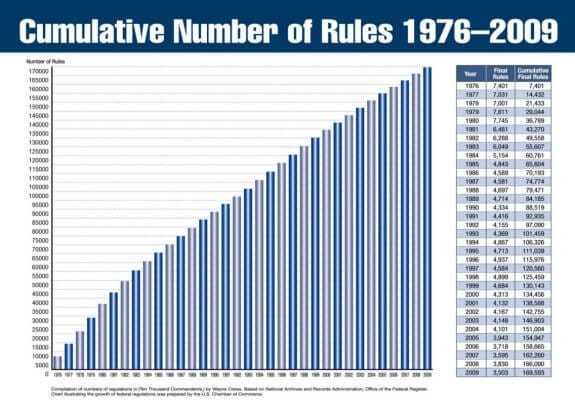
Regulatory burden on business and labor from the 70s through the 00s. The situation has worsened in the years since.
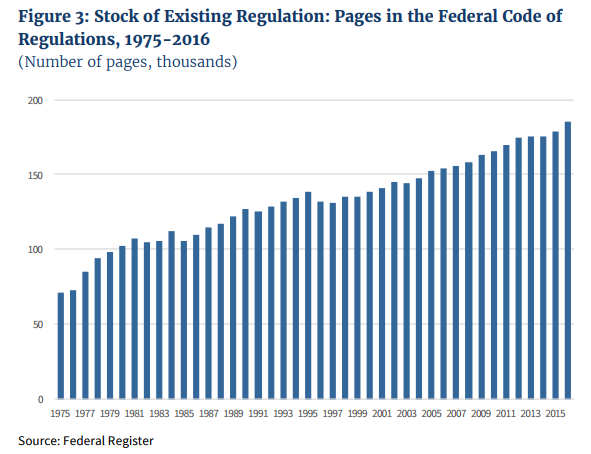
Same information in thousands-of-pages rather than numbers-of-rules, 1975-2015
Similar bureaucratic growth can be seen over the same period in every single area of government—a fact disguised on economic reports because civil “servants,” who create no value (even if you buy the line that they aid the conditions for value creation) are still counted in GDP calculations.
The multiplication of mandarins (i.e. bureaucrats) was a precursor to the fall of the second German empire, the fall of the Roman Republic, and the French Revolution.
This loss-aversion-led growth in the bureaucracy neatly sets up our second domino:
2) The National Debt
Public employees gotta eat, as do all the donors that keep our politicians in yachts and orgies and hookers and stately homes. So do the defense contractors, the titans of industry who are forced by bureaucratic blackmail to lobby endlessly in order to avoid regulatory scrutiny, and the charities and NGOs and universities who derive the bulk of their income from government grants and/or perverse incentives set up by the regulatory state.
Unfortunately, there is literally not enough money in the country to keep them all afloat.
Well, there isn’t enough money right now. But in the future, there might be. So the government engages in a little trick called “deficit spending,” where they borrow the money they need to pay this year’s graft…uh, I mean “bills”…so that they can keep the state strong. As long as that debt—and the interest on it—is running below the annual GDP of the country, a healthy economy can keep up with the payments.
If interest rates rise, though, you could be in trouble. If spending rises faster than growth, you can get into real trouble. But if you have the world’s reserve currency, you can suck up all the wealth from the rest of the world and issue debt in return—and, as you’re doing that, you’re also increasing the money supply, so the debt you’re issuing is eventually going to be worthless. Sure, it’s a Ponzi scheme, but everybody knows it, so no harm, no foul, right?
Unfortunately, this is the same money that all the rest of us use to buy bread and pay rent.
The result is inflation.
A lot of inflation.
Inflation that, no matter how much the government lies about it, no matter whether they actually curtail spending, is not going to stop any time soon for a number reasons that will take too long to go into here.
From Rome to nearly all of the Chinese dynasties to the Spanish Empire to the British Empire to the Japanese financial crisis of the 1990s, massive inflation always precedes currency collapse.
So does public indebtedness.
Here’s what the US national debt looks like over just the past few years:
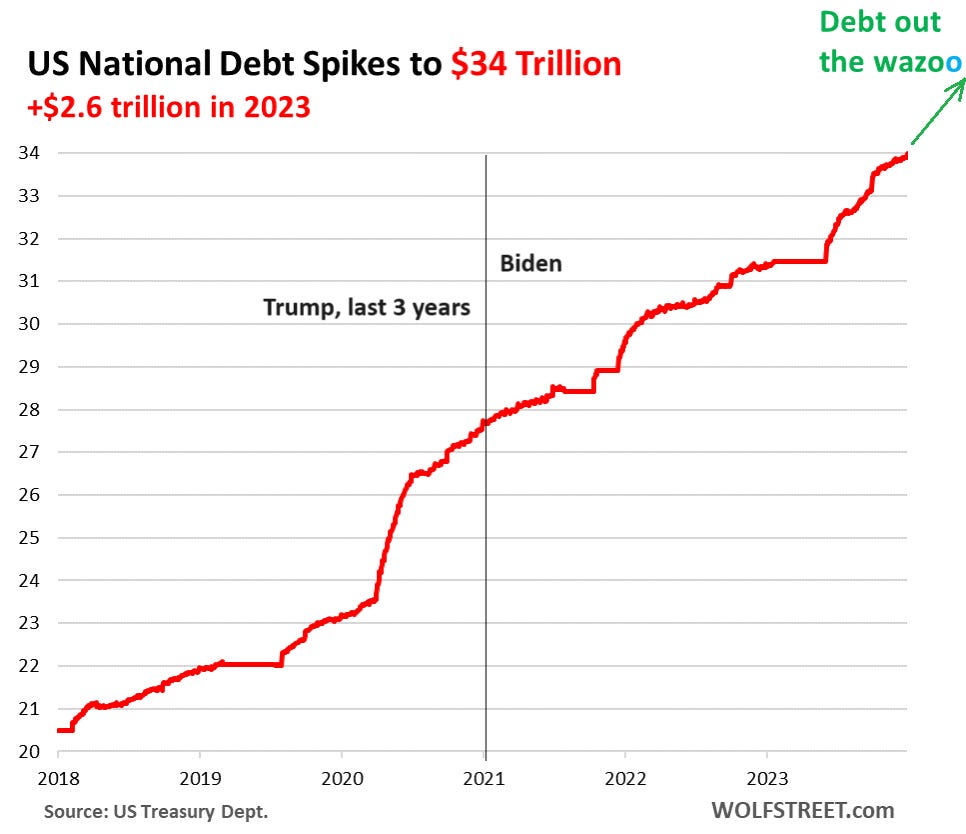
That is what it looks like when an economy is about to go into meltdown. Many prognosticators aren’t worried, since the Chinese (and several others) are worse off—we’ll be the last man standing, so to speak. People will need the dollar, and that will save us.
Alas, there’s nothing in history that implies that only one great empire can collapse at a time—indeed, from the Bronze Age Collapse in the 12th century BC to the collapse of the dozens empires and governments connected to the Roman world, interconnected economies tend to act like mountain climbers who are roped together on a precarious glacier:
When one falls, they all fall.
3) Political Prosecutions
Not to be crass, but all justice systems are political and politicized. Justice systems exist entirely to defend the legitimacy and enforce the will of the State—not to mete justice. The arrangement works so long as the majority feels like it’ll get a fair deal, while the groups targeted for persecution are small, unpopular, actually dangerous, and/or easily engender disgust (for example: popularly detested ethnic minorities, the homeless, drug users, organized crime, street thugs, etc.). Legitimate or illegitimate, such prosecutions reinforce social solidarity and elevate social trust.
The United States no longer has anything like that kind of justice system.
Here are some examples to consider from the past eight years:
- Biden’s classified documents handling (or Clinton’s email server) vs. the Trump documents situation
- The FBI-suborned fake plot against governor Whitmer of Michigan when she needed political ammunition against anti-lockdown activists
- FBI targeting of parents who protested curriculum and library materials at school board meetings while declining to investigate the 2020 riots that burned cities across the country
These three examples from hundreds over the past few years have convinced a non-trivial proportion of the population that the entire justice system in the United States is as politicized as a junta Star-Chamber. The growing popular conviction goes like this:
If you’re a member of the wrong party, the wrong ethnicity, or the wrong religion, you can forget about getting a fair shake in the United States.
This is a pressure cooker, and it’s coming to a boil.
4) Elite Isolation
Successors are a tricky business in politics. A prince who wishes to pass a legacy on does well to groom successors who love him. A prince who intends to hold on to power no matter what the cost grooms successors who are too stupid and incompetent to oppose him. Our loss-averse ruling class farms its successors almost exclusively from the Ivy League, which has now for decades produced some of the least competent, least educated, and most nakedly fraudulent graduates in all of academic history (witness the recent Harvard plagiarism scandal—also heed the words of Peter Boghossian and the many other great minds who have either been drummed out of academia or who ran away screaming in order to avoid its lockstep group-think).
The result is not just a ruling class that cannot rule, it’s a socially isolated ruling class that doesn’t know the first thing about the country it governs or the world in which it operates—a class which, thanks to one academic scandal after another (many of which have been stunningly documented by Mike Nanya) the hoi polloi can now see exposed for the naked, incompetent, and weak emperors that they are.
When told that the people were starving for lack of bread and thus threatening revolt, queen Mary Antoinette of France allegedly declared “Let them eat brioche.” Frequently mistranslated as “cake,” brioche is a luxurious egg-and-butter-saturated bread which was only available to the wealthiest of France.
Not long after she allegedly said this, she was beheaded by the mob and France was plunged into a succession of tyrannies, terrors, and wars that were only brought to heel when Napoleon turned all that terrible energy into a conquering force that marched across Europe.
Similar tales can be told for Tsar Nicholas (who was deposed by the October Revolution which eventually shuffled the Bolsheviks into power and created the Soviet Union) and many, many others.
Out-of-touch elites create civil wars and revolutions. Weakness in the ruling class doesn’t just kill rulers.
It kills millions.
6) The Split between Men and Women
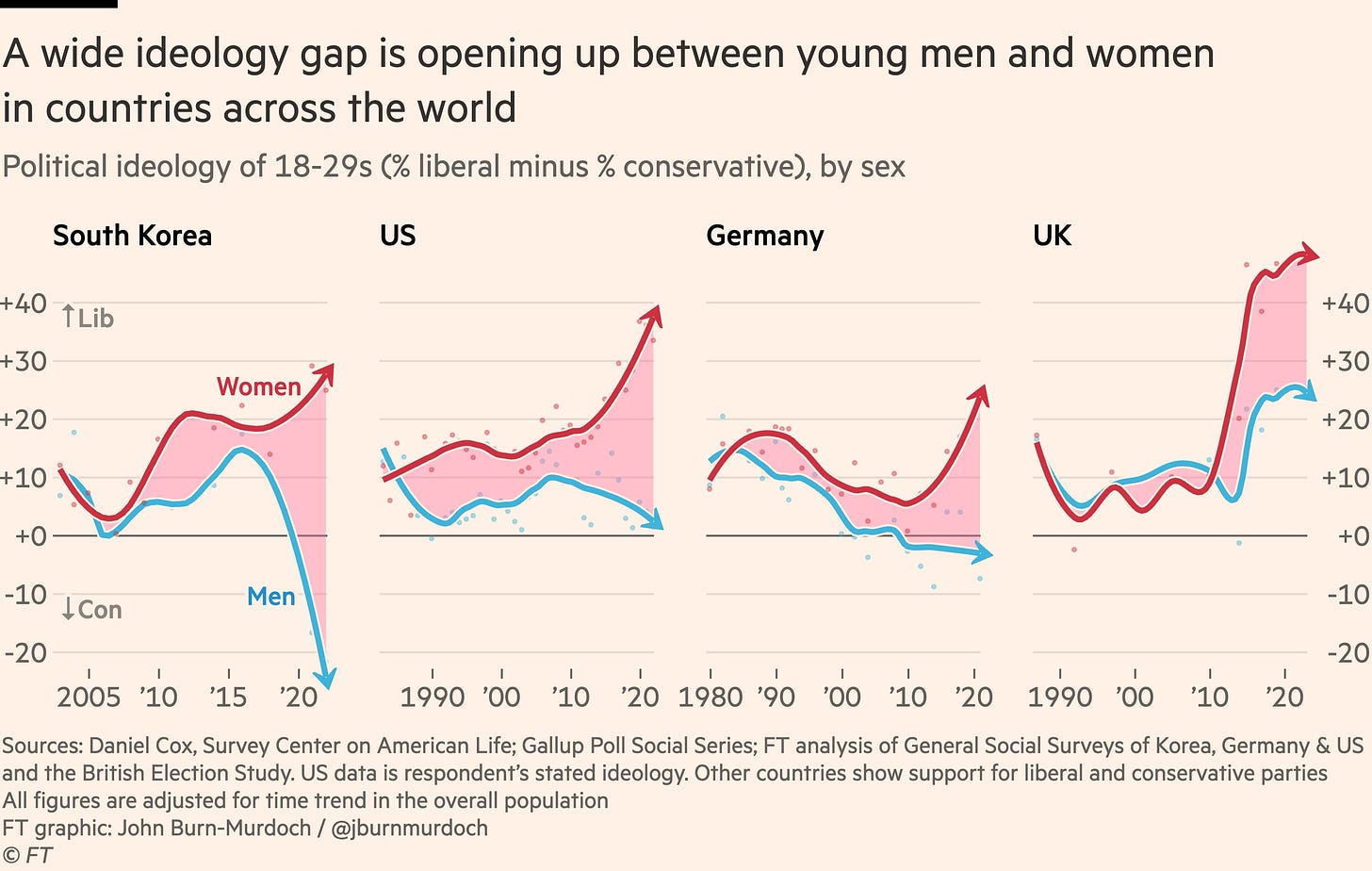
The debt burden, the regulatory burden, the increasingly prohibitive inflation-driven cost-of-living, and the social bubble surrounding our elites have conspired together to lock young men out of all socially respectable avenues of advancement. The result is that while young men increasingly turn to the trades to create a stable financial base, young women are almost exclusively being pumped through the corporate-track university system. This puts men in a situation where their worldviews are informed by regular hard-contact with reality, while women increasingly live in a world of theory and abstraction.
This creates a major divide between the sexes on at least two fronts:
Firstly, those who live in an abstract world (accountants, philosophers, theologians, mandarins, financiers, etc.) develop politics, morals, and worldviews that are rigid, doctrinaire, and idealistic while those who live in a more concrete world (soldiers, tradesmen, entrepreneurs, the poor) develop worldviews that are more pragmatic—they have to be, since the real world is not kind to idealists.
Secondly, those who live in an abstract world enforce their norms and their will through courtly politics (indirect speech, reputation destruction, gossip, innuendo, moral censure, shunning or “cancellation”). In this world, while there are people “in charge,” the social consensus drives the bus and nobody really controls it. On the other hand, those who live in a more concrete world enforce their norms and will directly (direct speech, intimidation, threats, hard power, and coordinated action), and who dares, wins. In this world, there are leaders who run the show. They live by the sword, and they die by the sword.
In a world with such a divide, women are nearly wholly dependent on the political system (since they have become the aspiring mandarin class) while men are nearly wholly outside the political system (since they have been blocked from the avenues to power). The moral and social norms of the sexes are directly opposed the time in life when both sexes are highly motivated to mate—and one sex lives in a world where they will do “whatever works” (the definition of pragmatism) to get what they want. For them, violence, though regrettable, is always an option.
Does crossing such a cultural divide sound impossible to you?
There are many young men who agree with you.
7) Virginity rate
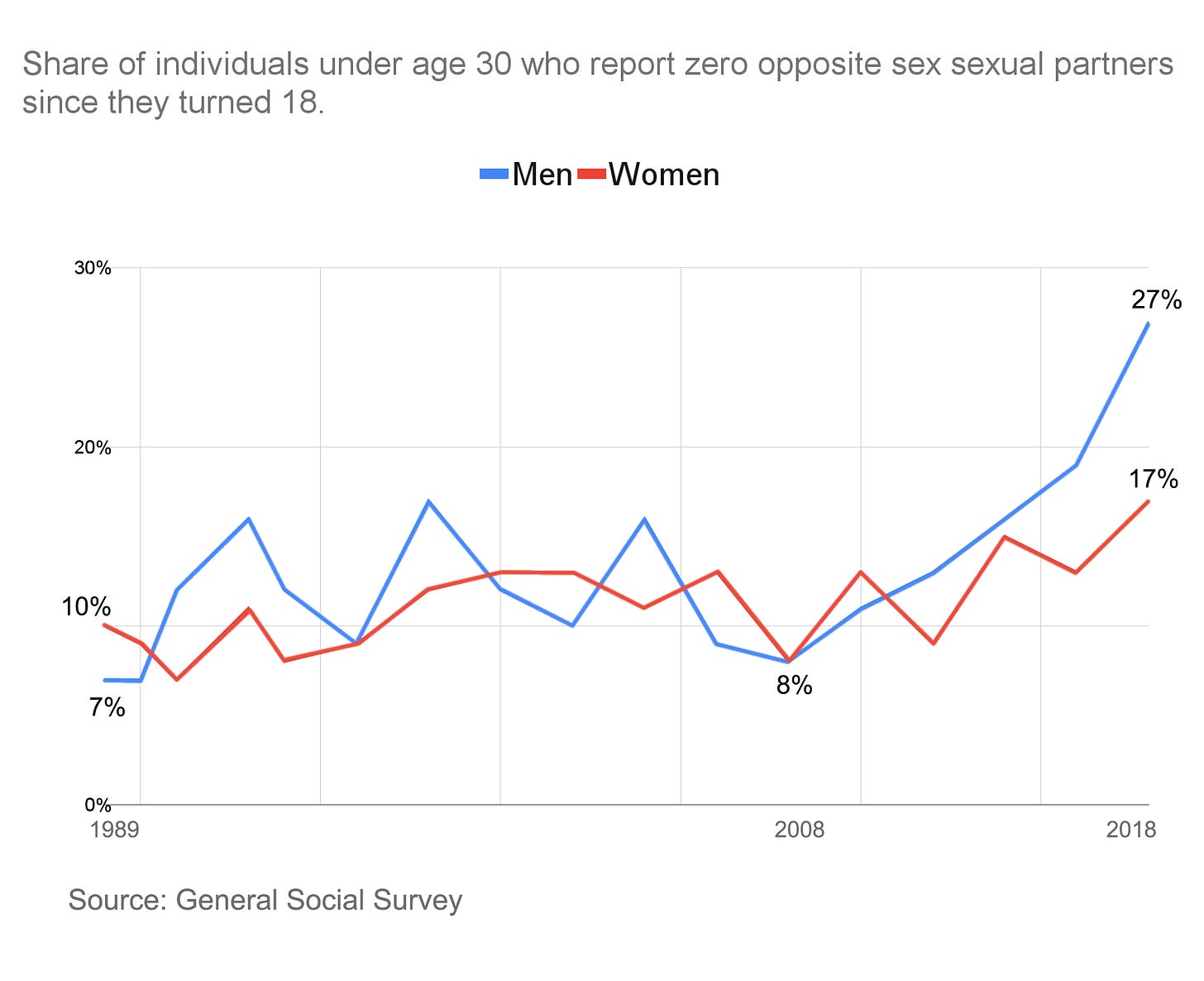
Late Millenials and Gen Z are not mating. Women who are finding partners are looking higher up in the age distribution (up to and including Gen X) in order to find men with whom they can relate well enough to form attachments (whether short term or long). Among the twentysomethings, the most desirable young men (along whatever metric) are getting all the girls, and their antics are burning the girls out on men who haven’t grown up and settled down. The mating market is dominated by young players and well-established thirty-to-fiftysomething men—regular young men are squeezed out to such an extent that nearly a third are virgins (excluding some high school fumbling) at age thirty.
Take heart, conservatives! Your dream of the death of pre-marital sex is nearly achieved! Ironically, abstinence education was a bust; it took all of the above conditions (plus the ready availability of porn to give young men a sexual outlet and keep the rape rate down) to do it.
But putting the bitter sarcasm aside…
If you don’t know history, this situation is grounds for pity. Young men and young women need one another, because most people are not so-built that they can live a happy life without a partner with whom they can face life’s challenges. Even when the divorce epidemic ended 50% of all marriages, only about 20% of married people ever experienced divorce—those who get divorced once are much more likely to get divorced a second and third time, which skews the statistics.
But if you do know history, these numbers should terrify you, because, as documented by Napoleon Chagnon and many others who study primitive civilizations, as well as those who study the history of the Vikings, the Hordelands of Asia, the native tribes of the Americas, and Ghenghis Khan, the original, ancestral, primary form of warfare was this:
Surplus men going forth in raiding bands to slaughter outgroup men and take their women.
The Last Days
And the seventh angel poured out his [bowl] into the air; and there came a great voice out of the temple of heaven, from the throne, saying, “It is done.”
—Revelation 16:17, King James Version
Over-determination is the situation in which a number of factors are in play, any single one of which is enough to precipitate a major historical event. In such a situation the correct question isn’t “What caused this event?” but “What made that event happen the way it did and at the moment it did, rather than another way, or a few years earlier or later?” (I covered this in more depth in my essay Understanding Before Thinking).
Every single one of the above dominoes is enough to make a country crack.
Many of them are enough—on their own—to plunge a nation into civil war.
All of them are present together, now, and at the same time, in the one nation whose existence keeps the globe relatively quiet and free of war compared to historic norms (even at the current moment).
This constitutes an over-determined civilizational collapse on par with the end of the Bronze Age. All that we need to kick off the apocalypse is for the wrong person on the world stage to flinch at the wrong time.
And, in this context, the most powerful man in the world stood alone before the press corps, out of reach of his handlers, and revealed himself to be too weak to merit respect.
When a lion is injured on the veldt, the scent of his blood draws hyenas. They find him, and trap him, and fall upon him, tearing his flesh from his bones until nothing remains.
When Biden walked off that stage, the press fell upon him like a pack of hyenas and started ripping him to pieces.
It matters not whether we have an invasion going on at the southern border, or whether our government is thoroughly infiltrated by agents of the CCP, or whether both concerns are entirely unfounded.
Our ruling class, institutions, and social trust are far too degraded to withstand the fall kfany single one of the dominoes we face without a major, decade-long disruption to the power and unity of the United States.
If there was any doubt of that before tonight, the President removed it all.
The United States stands upon the brink.
And now, the world knows it.
God help us all.
This article is an unexpected installment in my Reconnecting With History series, where I bring to bear my four decades as a history and geopolitics geek on the strange world-historical moment unfolding around us.
Catch up here with the inaugural post: The Myth of the Myth of the 1950s
While you’re at it, you may also want to check out Unfolding the World series, a history of the current geopolitical storm rocking our world, its roots, and its possible outcomes.
When not haunting your substack client, I write novels, literary studies, and how-to books. You can find everything currently in print here, and if you’re feeling adventurous click here to find a ridiculous number of fiction and nonfiction podcasts for which I will eventually have to accept responsibility.
Please don’t try to tell me “nobody steals elections.” Of course they do. Election theft is one of the most profitable industries in any vote-driven political system, and both our major parties are very sophisticated about it. The question is which side steals it better, and when, and those are details that rarely come to public light until decades after the fact (if at all). Someone attempts to steal every election. How many succeed? I have no idea, but judging by what has come to light over the last two centuries, my priors would lead me to predict that the answer lies in the vastness between “some” and “most”.

